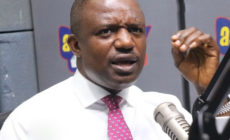Solution to ‘dumsor’: ECG needs Gh¢500m every year
- Posted on
- Comment
 The Electricity Company of Ghana (ECG) needs an injection of at least Gh¢500 million every year for the next five years before Ghanaians can have stable and uninterrupted power, a senior official of the company has disclosed.
The Electricity Company of Ghana (ECG) needs an injection of at least Gh¢500 million every year for the next five years before Ghanaians can have stable and uninterrupted power, a senior official of the company has disclosed.
William Boateng, Public Relations Manager of ECG, made the disclosure on Adom FM’s Dwaso Nsem morning show on Wednesday June 11, 2014.
A shortfall in power generation has plunged the country into erratic outages nationwide for over a year.
The situation has become so dire that residents of the Ashanti region staged a demonstration dubbed ‘Ya y? di?n’ on Tuesday June 10, 2014 to demand answers to what they say are the unusual outages being experienced in the region.
Currently, the power producers are shedding off about 300 megawatts of power because some machines have been shut down for maintenance and repair works.
The ECG has, therefore, released a timetable to guide and inform the public as to when to expect power outages in their vicinities.
Explaining what needs to be done to bring the situation back under control, Mr Boateng said there was an urgent need to invest in energy production and distribution.
Per their calculations, ECG alone requires an infusion of Gh¢500 million every year for the next four to five years in order to meet its obligations. The other areas in the sector, Volta River Authority (VRA) and Ghana grid Company (GRIDCO) have their own budgets, he added.
In the meantime, the Ministry of Energy has plans to increase the country’s energy production to 5,000 megawatts over the next two years to meet the needs of Ghanaians.
William Boateng urged government to speedily emulate the example of neighbouring Cote d’Ivoire, which has allowed independent power producers into the mix and has thus surpassed Ghana in power generation.
In the meantime, “We need to conserve more energy. We can even turn off some appliances like deep freezers while watching the world cup matches,” he advised.
In another development, about 80% of all the Ministries have been put on the prepaid electricity metering system, William Boateng of the ECG has revealed.
This is partly in fulfillment of government’s order for all of its ministries and agencies to be put on the prepaid system in line with its attempts to streamline use.
Author: Frank Agyei-Twum










 (Selorm) |
(Selorm) |  (Nana Kwesi)
(Nana Kwesi)